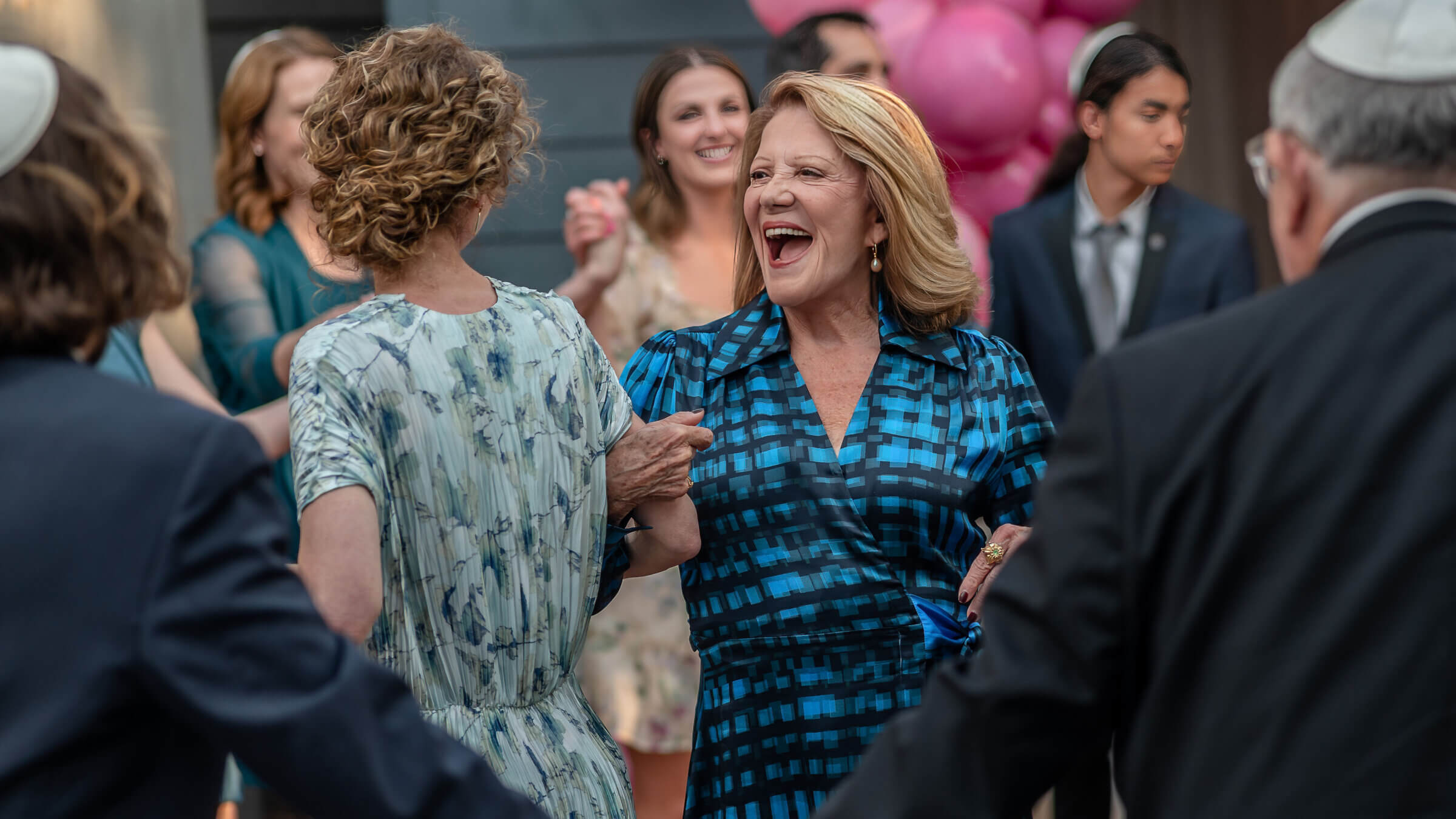Linda Lavin’s final role is also one of her most Jewish
Lavin, who died last December at 87, plays a grandmother in ‘One Big Happy Family’

One Big Happy Family features Linda Lavin in her final role. Courtesy of Falco Ink
When Linda Lavin’s Lenore, a grandmother, who prefers to be called Lola, greets a young man whom she recently learned was her daughter’s half-brother, her high pitched “Hal-lo-o-o” is uttered with at least three syllables and varying intonations. Her vocal delivery evokes anger, disappointment, distaste and skepticism, all gussied up beneath a cheerfully welcoming veneer. It’s very funny and a remarkable snippet of acting.
Lavin, who died last December at age 87, plays a supporting role in, alas, her final film, One Big Happy Family, which calls to mind My Big Fat Greek Wedding and, even more pointedly, Dani Shapiro’s book, Inheritance: a Memoir of Genealogy, Paternity, and Love. Both the film and Shapiro’s book emerge from our individual and collective obsession with ancestry, heritage and DNA.
Loosely inspired by the true story of writer, producer and star Lisa Brenner (The Ark, Say My Name, The Patriot), the movie centers on Rachel (Brenner), a self-defined neurotic Jew living a well-heeled life in the suburbs of Los Angeles. On the cusp of her allegedly traumatizing 40th birthday, Rachel — who has a public speaking phobia — is also grappling with the prospect of making a speech at her daughter’s upcoming bat mitzvah.
At the same time, the results of a DNA test, which she took as a lark, have returned and unexpectedly reveal that she’s only half-Jewish and her beloved late father isn’t her biological parent. Psychic and family chaos ensures.
Neither Lenore nor her late husband were philanderers, but it was believed that Dad was infertile and so Lenore underwent treatments at an infertility clinic, leaving it an open question as to whether Dad was or wasn’t the biological father.
Rachel, the child of an era that values transparency and disclosure above all, is furious at her mother who withheld the essential facts of her birth and lacks the imagination to understand why her parents, who came of age in a less self-revealing period, might not wish to share. She charges off, determined to find her biological father.
Spoiler alert: It turns out bio-dad is dead and, according to those who knew him well, wasn’t a very nice man anyway, thus liberating Rachel to love the father who raised her and whom she loved more than anyone. In this world one love does not preclude another — you can love many people in different ways. The major thematic thread that runs throughout is the definition of family.
But the hallmark of the film is the joyous merging of old comic Jewish stereotypes — think overbearing but well-meaning matriarch — with new comic Jewish stereotypes. Rachel’s husband is a Filipino doctor; her two daughters are biracial; her flaky New Age sister is a lesbian; her best friend is Black; and the best friend’s boyfriend appears to be Native American.
Uncovering her biological roots, Rachel discovers a half-sibling who is fully gentile; others who are Muslim; and still another who works as a tattoo artist and is way off Rachel’s socioeconomic grid.
Within the narrative’s limited parameters, the film, directed by Matt Sohn, a TV veteran making his feature film directorial debut, is structurally tight and moves along briskly. And, despite its contrivances and emotional manipulations, the picture is well acted and, at moments, both touching and quite amusing, thanks largely to Linda Lavin, who once again gives a seamless performance.
Lavin, perhaps best known for playing the titular feminist icon in the TV sitcom Alice and for her searing, Tony-winning turn in Neil Simon’s Broadway Bound often married a steely strength with poignancy and comedy. A favorite moment of mine in Family is the way she flirts with Rachel’s yoga teacher, shaking her head from side to side and languidly tossing back her hair. It’s a small sexy bit that nonetheless lingers.
The final scene, the bat mitzvah, is predictable, with everyone coming together and rising to the occasion, especially Rachel, who has overcome her fear of public speaking and welcomes her daughter into Jewish womanhood and embraces her own mother with renewed appreciation and love as a United Nations of ethnically and culturally diverse family members and friends joins in the celebration.
Not to put too fine a point on it — One Big Happy Family is, after all, a trifle — but that climactic coda summons forth a Jewishness free from tribalism that is simultaneously, and paradoxically, also its lifeline, however redrawn the Jewish experience may have become. And, in this film’s humanistic universe, that’s the ideal.
















